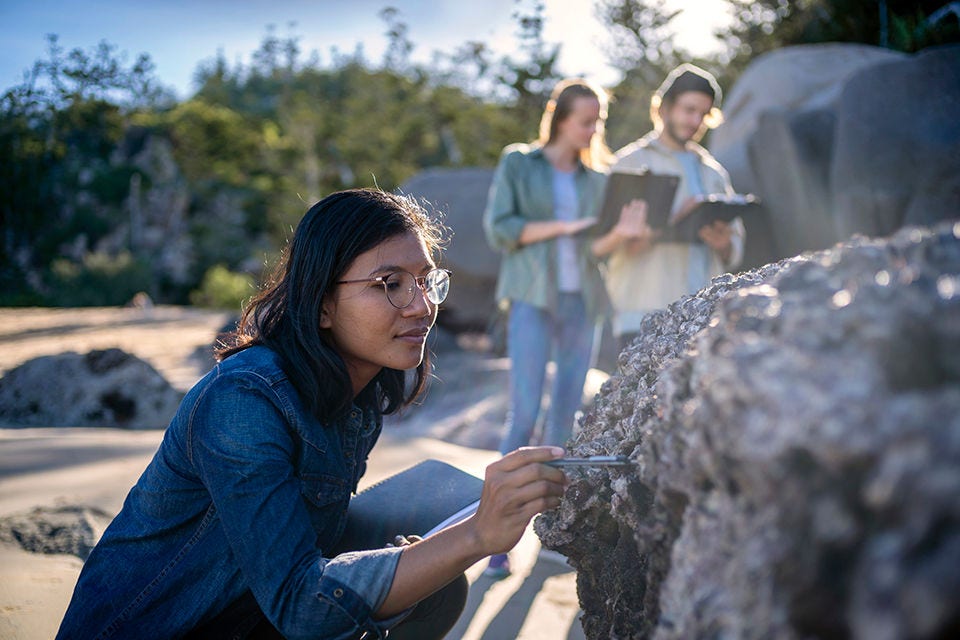Why Australia?
The ideal ‘green’ environment to study in
Australia’s natural beauty and spectacular environments give you an ideal place to develop your understanding and expertise in environmental issues. The strict environmental laws in Australia make sure nature is protected and levels of emissions remain low.
A qualification that’s recognised across the world
Australian courses are designed to meet international standards. You can be confident that your studies in environmental sciences and sustainability will be valuable wherever you go. In 2022, 8 Australian universities were ranked in the world’s top 100 for environmental sciences education.
Australia is doing its part for the world
To meet the UN’s sustainable development goals, like climate action and clean energy, countries need to play their part in solving complex environmental and policy challenges. Australia is doing this through new projects to drive climate action, innovations in renewable energy, and sharing technology to help others develop the environmental data.
Study options
Follow your passion for protecting our fragile natural environments and help create a healthier Earth for future generations.
Environmental sciences and sustainability courses will open up your understanding of global, regional and local environmental issues, and give you the practical skills to make a difference.
You can choose from courses focusing more on applied sciences (like chemistry or biology) or social sciences (like policy and planning). There are also courses that combine both of these and give you a broad skill set to tackle environmental issues (like environmental studies and environmental safety). You might even study specific types of environments, like rainforests or marine areas.
Some of the topics you can choose to study include:
- environmental impact assessment
- soil and water conservation
- natural resource management
- environmental biology
- global warming
- wildlife conservation
- marine protection
- renewable energy
- environmental health and safety.
If you are looking for a qualification that is more hands-on and takes less time than a university degree, Australian vocational education and training (VET) providers offer skills training courses that have been created with advice from industry experts. These courses include specialist sustainability training in areas like:
- competitive systems and practices
- environmental monitoring and technology
- renewable energy
- electrotechnology and photovoltaic systems
- water operations and management
- sustainability risk and energy management.
The environmental sciences and sustainability field might be right for you if you are passionate about finding solutions to local and global environmental problems, you are a team player and can see how every small effort makes a difference, and you enjoy getting outdoors as part of your studies.
Fast facts
Quality education
8 Australian universities are ranked in the world's top 100 for environmental sciences. (Source: QS World University Rankings by Subject 2024).
Sustainability leaders
The Times Higher Education and QS Sustainability rankings place many Australian universities in the top 100 for improving sustainability and having positive social impact.
Earth Hour
This global event started in Sydney in 2007 and now encourages millions to turn off their lights to raise awareness of important environmental issues.
Career options
The list of environmental sciences and sustainability careers across the world is growing. As we face more complex environmental challenges, more professionals are needed to solve problems from many different angles.
The roles you might have are diverse. Here are just some of the options:
- ecologist
- environmental conservation officer
- water quality analyst
- environmental lawyer
- solar energy consultant
- environmental scientist
- toxicologist
- meteorologist
- geologist
- environmental toxicologist
- policy analyst
- environmental planner.
People with environmental sciences and sustainability qualifications often work in various industries that interest them, like mining, energy, transport, building and construction, and even education. As you study, you will be able to decide which field suits you and the kind of work you are interested in – whether it is hands-on and outdoors, researching in a science lab, influencing public policy and preparing reports, or educating others.
In any environmental sciences and sustainability career, you will be part of an important global network of passionate individuals, all working together to create a more sustainable future.
Jobs in demand
Australia has a strong network of professionals working in this field. There are around 33,800 working as environmental scientists, and many other environmental science and sustainability professionals in fields like economics, policy and planning, occupational and environmental health, and urban and regional planning.1
The Australian Government is looking to open up even more environment and sustainability jobs over the next few years too. In 2022, it invested a record A$25 billion to drive renewable energy projects, like the National Hydrogen Strategy for renewable energy, and these projects could open up thousands more jobs in the next few years.



